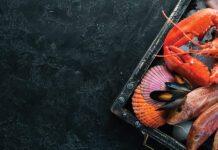In 2017, the Technomic Canadian Centre of the Plate Consumer Report noted that 75 per cent of Canadian consumers are more likely to buy seafood that is locally sourced and 29 per cent said they’re willing to pay more for it. Chefs aren’t taking that statistic as pressure per se — although it can create challenges. Ocean Wise, a program created by the Vancouver Aquarium, certifies seafood as sustainable. It also partners with restaurant operators/chefs to ensure they have the most current scientific information regarding seafood so they can make ocean-friendly buying decisions. Those meeting Ocean-Wise criteria can display the Ocean-Wise symbol on their menus.
Ned Bell, executive chef at the Vancouver Aquarium, Ocean Wise partner and author of Lure: Sustainable Seafood Recipes from the West Coast, says embracing sustainability doesn’t mean sacrificing taste. “We need to encourage our guests to try different foods so that we don’t over-farm or over-fish particular species,” says Bell. “That doesn’t mean you can’t have tuna, salmon or shrimp on your menu, but it does mean reading the label, knowing if it’s properly farmed, asking where and how the product was sourced.” For chefs in the early stages of diversifying their menu, Bell recommends exploring shellfish, mackerel, sardines and sustainable wild Pacific salmon (such as coho, sockeye and chum).
Bell created the organization Chefs for Oceans to engage his peers and create a community of like-minded foodies. “I recognized a huge need in the food industry for education and to raise awareness about what’s endangered and what’s sustainable.”
The most underused ingredient in Bell’s opinion? Seaweed. “There are over 10,000 edible plants in the ocean — just think about that.” Bell says there is potential for sea lettuces and plants to be used in more ways than just wrapping it around a sushi roll.
Earls Kitchen + Bar is an Ocean Wise restaurant partner with. “We’ve really listened to what’s been going on within the industry,” says Phil Gallagher, executive chef. “In terms of what’s trending, I always recommend Arctic char. It’s a good alternative to trout or salmon.”
Both Bell and Gallagher highlight the flexibility of a seafood boil. “Think of it as experimenting with the local shellfish,” says Gallagher. “When you are a conscious cook, it means you might have to try new flavours — and that’s something every chef and foodie customer should be excited about.”
Earls offers a Chorizo Mussel Pot, for example, which uses B.C.-sourced Salt Spring Island mussels and cured chorizo in a spicy chipotle-tomato broth paired with garlic bread.
“We’ve got to create dishes with the longevity of our planet in mind,” says Bell. “The foodservice industry won’t have a future unless we take care of the sea here and now.”




















